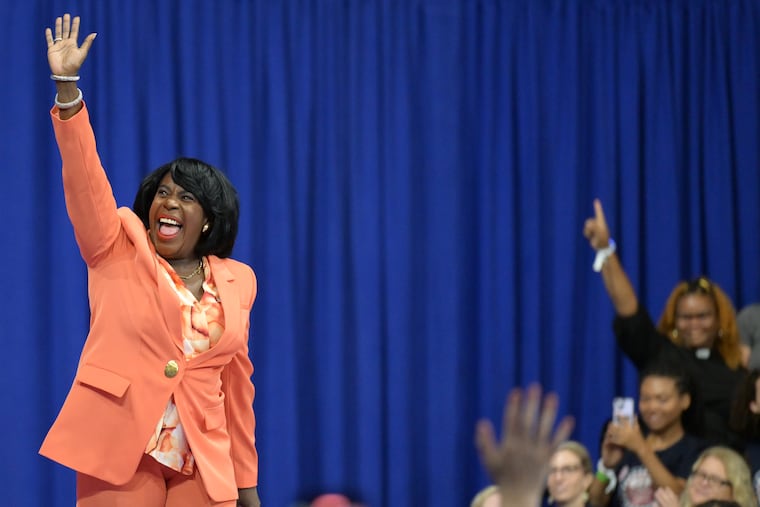A top Philly election official quit with four months until Election Day. Then the mayor got involved.
Philly’s director of election administration accepted a job in Montgomery County. Mayor Cherelle L. Parker visited her home to convince her to stay ahead of November’s high-stakes election.

A top Philadelphia election official resigned last month to take a job in Montgomery County, but she abruptly reneged after Mayor Cherelle L. Parker intervened as November’s critically important election approaches, according to two sources familiar with the situation.
Stephanie Reid, Philadelphia’s director of election administration, is responsible for overseeing day-to-day administrative operations for the Philadelphia City Commissioners, the three-member board tasked with running the election in the largest city in the state that is poised to decide the presidency.
Reid, who has been in the role since January, accepted a new job as Montgomery County’s deputy chief operating officer in July and was slated to start on Aug. 12, according to a spokesperson for the suburban county. Reid makes $150,000 annually in Philadelphia, according to city records. Her new role in Montgomery County offered a salary range between $150,389 and $200,521, according to a job posting.
But days before Reid’s start date, Parker met with her at her home last weekend and convinced her to stay in Philly, according to the sources, who requested anonymity to discuss a sensitive matter. Reid then withdrew her acceptance of the Montgomery County job and opted to stay in Philadelphia.
Reid declined to comment, saying in a text message that she is not authorized to speak to the media. Joe Grace, Parker’s spokesperson, said he would not confirm or deny any private meeting.
Parker’s involvement was an unusual move — the city commissioners are independently elected and run their office separately from the mayor’s administration. The episode and the mayor’s involvement demonstrated the extraordinary lengths to which city officials are willing to go to ensure November runs smoothly.
» READ MORE: The Philadelphia City Commissioners ousted their chair as they prepare to run the 2024 election
In 2020, all eyes were on Philadelphia in the days after the election as workers counted mail ballots, and it was a tranche of votes from the city that ultimately secured Pennsylvania — and the election — for President Joe Biden. Election officials in the city faced a barrage of threats as former President Donald Trump and his allies spread false claims of election fraud in the city.
The election is a key priority this fall for Parker’s administration as the city anticipates it could be at the center of a media and political frenzy yet again. Trump and Vice President Kamala Harris are locked in a tight race in the state, where the city and its suburbs could tip the balance.
Chief Deputy Mayor Sinceré Harris said the mayor’s office has historically provided “various levels of support” to the city commissioners, especially in high-intensity election years.
“The mayor’s office is committed to ensuring that the city commissioners have every available resource needed to fulfill their mission to execute efficient elections this fall with a process that is beyond reproach,” Harris said.
As Philadelphia prepares, Reid plays a key role in day-to-day operations of the election office. Her resignation and subsequent about-face followed a reorganization of the office that has resulted in months of open tension among the Philadelphia City Commissioners. Democrat Omar Sabir, who chairs the board, and Republican Commissioner Seth Bluestein have repeatedly expressed confidence in the city’s ability to run elections.
In January, the city commissioners hired Reid to oversee election administration. Around the same time, Sabir, with the support of Bluestein, replaced the now-former chair, Commissioner Lisa Deeley.
Deeley’s office and Bluestein both declined to comment on Parker’s efforts to keep Reid on staff. Deeley’s office referred questions to Sabir, whose office did not respond to a request for comment.
» READ MORE: Philadelphia City Commissioners’ office to spend $1.4 million to combat election misinformation
Sabir and Bluestein then voted to hire Reid and promoted another election office employee to handle the day-to-day election responsibilities. Prior to the reorganization, the commissioners themselves, and their deputies, filled that role. Reid had experience in election administration — she previously worked in the Managing Director’s Office on projects including partnering with the city commissioners to run satellite election offices where people could request and submit mail ballots during the COVID-19 pandemic.
Following Deeley’s ouster, the tension between the commissioners was palpable during public meetings, VoteBeat reported earlier this year. Deeley called the reorganization a “power grab” by her fellow commissioners and said she worried having an inexperienced chair take over the year of a presidential election would negatively affect the operation. Sabir and Bluestein had argued the change would bolster the office.
Top officials in Parker’s office said they’re well aware of the stakes of the city’s election administration this year.
Harris pointed out that the mayor’s office worked with City Council this year to increase the city commissioners’ budget by $4.3 million — a 15% funding bump — and to bolster staffing. She said the administration will also collaborate with the city commissioners to provide “surge staffing,” police presence, and information technology support ahead of November.
“These are all ways that the Parker administration is continuing the tradition of supporting the city commissioners,” Harris said, “especially in an election year such as this.”